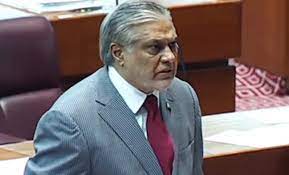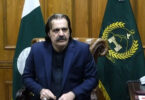F.P. Report
ISLAMABAD: Federal Minister for Finance and Revenue, Senator Mohammad Ishaq Dar on Friday firmly denied media reports claiming the imposition of additional taxes on agriculture and real estate sectors to meet the International Monetary Fund’s (IMF) requirements.
“I am categorically announcing on the floor of the house that there will be no new taxes on agriculture and real estate. We have faced numerous hardships due to the International Monetary Fund (IMF) requirements, and we have diligently met all the prior actions,” the finance minister said while speaking at the National Assembly. The minister further emphasized that the news was entirely baseless and lacked truth, clarifying that all fiscal decisions made by the government were aimed at fulfilling IMF’s requirements and commitments.
Senator Ishaq Dar also offered his readiness to provide detailed information on these specific issues to anyone seeking clarification. Discussing the economic situation, the finance minister mentioned that if the government continued its present policies, the inflation rate was expected to decrease to 7 per cent, based on the working of the State Bank.
Attributing the country’s economic hardships to Pakistan Tehreek-e-Insaf’s backtracking from commitments, Senator Dar proudly stated that with the government’s efforts, Pakistan had successfully reached an agreement of $3 billion with the IMF. As a result, the State Bank of Pakistan received the first tranche of $1.2 billion to stabilize the economy.
Speaking on the current foreign exchange reserves, he informed that the reserves had reached their highest position since October 2022. The total liquid foreign reserves were reported to be US$ 14,065.3 million, with the central bank holding $8,727.2 million, thanks to inflows from Saudi Arabia, the United Arab Emirates (UAE), and the IMF. The central bank had received $2.0 billion from Saudi Arabia, following $1.2 billion from the IMF, and $1.0 billion from the UAE, contributing to the net foreign reserves held by commercial banks at US$ 5,338.1 million.
The finance minister reassured the public that the government had made all due payments in accordance with international agreements, further demonstrating its commitment to meeting obligations on time. Highlighting the government’s commitment to financial transparency, Senator Dar shared the IMF agreement and stated that it would be made available on the Ministry of Finance’s website for public information. The minister also handed over a copy of the agreement to the lower House of Parliament.
Islamabad airport set for 15-year outsourcing to enhance operational activities: Minister for Aviation Khawaja Saad Rafique said that Islamabad International Airport would be outsourced for a period of 15 years to improve its operational activities.
In response to a calling attention notice in National Assembly sponsored by MMA lawmaker Maulana Abdul Akbar Chitrali regarding the outsourcing of the airport, the minister clarified that the move does not equate to privatization. Instead, it aims to bring in proficient operators to enhance airport operations, he said. Khawaja Saad Rafique emphasized that open competitive bidding would be ensured, allowing the best bidder to be given the opportunity to operate the airport.
The process, he said will be profit-oriented, ultimately benefiting the national exchequer. The International Finance Corporation will serve as the consultant, and already 12-13 companies have shown interest in participating in the bidding process, he added. The minister assured that the process would be transparent and adhere to all rules and regulations.
However, the minister clarified that the runway and navigation operations would not be included in the outsourcing process. Highlighting the success of outsourced airports in other countries like India and Turkiye, Khawaja Saad Rafique mentioned that even Madina airport has been efficiently outsourced to deliver enhanced services.
The minister also stressed the need to restructure Pakistan International Airlines (PIA) to address its substantial deficit, which has reached Rs. 80 billion this year and is projected to increase to Rs. 259 billion by 2030 if not dealt with appropriately. He asserted that no employees would be laid off, and all existing staff would retain their job security and privileges. However, he also mentioned that best practices would be implemented to ensure facilities at airports are efficiently managed.
Regarding the future plans for PIA, Khawaja Saad Rafique informed that the total liability of PIA amounts to Rs. 742 billion, with only 27-28 planes currently operational. He urged the necessity to save the institution and underscored the importance of the restructuring legislation, which has been approved by the National Assembly in the previous sitting. To address the deficit, the minister revealed plans to restore flights to the UK within three months, followed by the resumption of flights to the US and Europe.
Khawaja Saad Rafique issued a warning that immediate reforms were crucial to prevent further escalation of the deficit in the coming days. He acknowledged that a statement from a former federal minister for Aviation had created problems for PIA.
However, he assured that all audits and tests have been successfully cleared, demonstrating the government’s commitment to transparency and accountability. Furthermore, as the minister overseeing the Railway portfolio, he recommended engaging industrialists to invest in the railway sector instead of opting for privatization.







